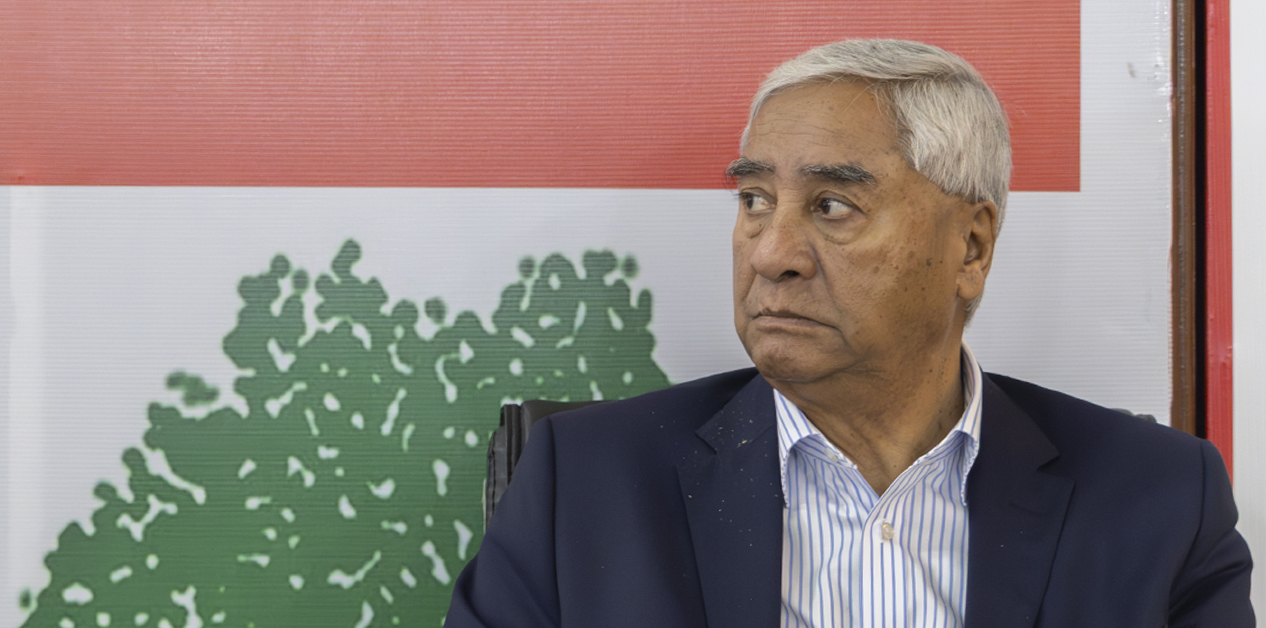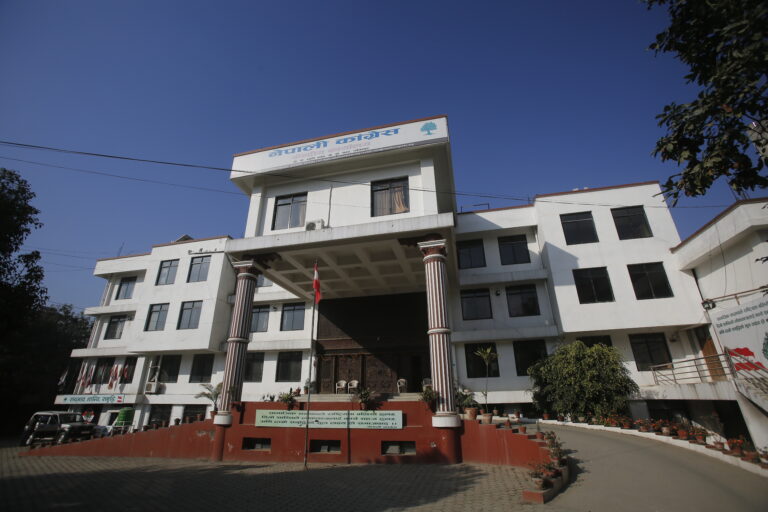
Nepali Congress President, target of the Gen Z movement, still clings to his post

KATHMANDU: On the evening of September 15, Nepali Congress General Secretary Gagan Kumar Thapa announced on social media that he was ready to resign from his position as General Secretary for the transformation of the party.
Stating that, in line with the essence of the Gen Z movement, the party should commit to reform beginning on Constitution Day itself, Thapa said he must be ready to give up his organizational responsibility and take new risks for radical reform within the party.
“For this, I am willingly prepared to resign from the position of General Secretary. Let us start the discussion on this. Let us admit—mistakes have been made, and let us conduct self-reflection, self-evaluation, and self-determination,” said General Secretary Thapa.
Ironically, even as Thapa declared that he would resign from the party’s second most powerful position, Party President Sher Bahadur Deuba remained silent. The Gen Z movement, which claimed more than 72 lives, had mainly targeted President Deuba and his wife, Arzu Rana Deuba. Protesters had set fire to Deuba’s residence in Budhanilkantha. Demonstrators had attacked the Deuba couple and even injured them.
Deuba had already been Prime Minister five times, Party President twice, and was preparing to become Prime Minister for the sixth time with the support of the UML. He had played a decisive role in forming the unnatural power-sharing alliance between the first and second largest parties in Parliament.
By aligning with the UML for power, Deuba placed the constitution and parliamentary system in jeopardy. Somehow, the President saved the constitution, but Deuba himself could not save himself from the protesters. Beaten mercilessly and bloodied at his own residence, he narrowly escaped with his life, but he has not taken steps to save the party. Although pressure has mounted for him to resign as Party President, he has not yet taken any initiative to protect the party.
President Deuba is under pressure to relinquish party leadership. On the evening of September 15, district presidents joined via Zoom, demanding leadership transformation and that President Deuba clear the way. District presidents concluded that because of Deuba, the public’s trust in the party had turned into disappointment.
Even within the central leadership of the party, there are demands that Deuba, who once fought for democracy, must now retire. However, Deuba has no intention of resigning from the presidency at this time. Deuba’s close ally and head of the party’s publicity department, Min Bishwakarma, argues that it is not timely to immediately remove President Deuba and other senior leaders, who are recovering their health in hospitals.
“Things cannot continue as before. Only if the responsibility of a renewed Congress is handed over to the shoulders of the youth will the party rise above the status quo,” says Chatur Bahadur Chand, Congress President of Baitadi.

Pictured before it was set on fire during the Gen Z movement, the Congress headquarters. Photo: Bikram Rai/Nepal News
Even leaders, including Deuba, who have already held top positions in the party, have spread disappointment instead of hope among the people, leading the public to become fed up with the Congress.
According to political analyst Shankar Tiwari, Deuba can no longer run the party. When the main leader of the party fails in both policy and momentum within the democratic system and national politics, he must clear the way, says Tiwari. “The more President Deuba prolongs his leadership by citing excuses, conditions, or physical state, the more he will push the party into the abyss. His policy, methods, and style of work have already failed. The sooner he resigns and clears the path for the party to move forward, the better,” says Tiwari.
Every crisis opens the way for new possibilities. The Gen Zs have provided Congress with the opportunity to reform the old, entrenched structure. The Gen Z movement has already confirmed that Congress cannot move forward in its current state.
Nepali Congress leader Arjun Narsingh KC also says the party cannot advance under the status quo. He concludes that the party cannot go to the public with its current pace, mindset, and policies. He believes there should be no delay in reconnecting the party, which has been separated from the younger generation, with the youth again.
“In its current state, the party cannot reach the people. This will not bring any results. Therefore, the Congress must revive itself through radical change, by increasing the feelings and participation of the youth—and we will rise again,” he says.
Despite the party still having around 900,000 active members, President Deuba does not appear to be making efforts to strengthen the Nepali Congress. “The people’s trust in Congress has not been lost, but anger has grown because of the old leaders. There is no alternative but to immediately change the leadership and go to the people,” says central ommittee member Madhu Acharya. “Even the group of seven or eleven leaders have had a hand in making the President fail. The party cannot run or be transformed under them either. It must move to a new generation.”
Following the Gen Z uprising, the Nepali Congress Working Committee met on September 12, that is, last Friday. Even before this, pressure was mounting within the party ranks for leadership change. Ironically, that meeting could not even discuss the party’s future course. Instead, it issued a statement declaring the dissolution of Parliament unconstitutional.
Even leaders, including Deuba, who have already held top positions in the party, have spread disappointment instead of hope among the people, leading the public to become fed up with the Congress.
Despite the party still having around 900,000 active members, President Deuba does not appear to be making efforts to strengthen the Nepali Congress.
In this context, discussions are ongoing within the party’s publicity department via Zoom about how the party should move forward, says publicity department chief Min Bishwakarma. “The people, the country, and the cadres are disoriented. At this time, since the responsibility is to save the country, the system, the people, and the party, there is no alternative but to move forward calmly,” he says.
The path to leadership change
If party President Deuba does not step down, there are also options for party transformation. According to central committee member Madhu Acharya, leaders are convinced that the party cannot move forward in its current state. Therefore, in line with the statute, they are taking the initiative for leadership change, and he says the party must immediately call a central working committee meeting to clarify the future path for leaders and cadres.
“If even a minute is wasted in holding the central committee meeting, the party’s reputation will fall further. The leadership must immediately call the central committee and provide a way out,” he says.
According to disgruntled voices, it is necessary to conduct a “transformational rebellion” by relying on the statute itself—bidding farewell to President Deuba and his generation, and creating a new Congress by internalizing the message of the Gen Z uprising.
The first option to displace Deuba is to make Senior Vice President Purna Bahadur Khadka the acting president and hold a general convention within six months.
“If even a minute is wasted in holding the central committee meeting, the party’s reputation will fall further. The leadership must immediately call the central committee and provide a way out,” Madhu Acharya says.
The 1960 party statute, amended ten times, provides this arrangement in Article 26. “If the resignation is approved by the central working committee, the vice president will become the acting president and assume responsibilities, and within six months a special central general convention will be called to elect a president,” explains Madhu Acharya, adding, “Although the statute says six months, we must provide a way out by holding a special general convention within six weeks.”
If Deuba does not resign voluntarily, Article 17, Sub-clause 2 of the statute allows 40 percent of the central working committee members to call for a special general convention within three months through a written request. Acharya adds, “The statute provides for a special general convention to be held within three months. But with the current general convention representatives, a general convention could also be held within three weeks to select new leadership.”
However, publicity department chief Min Bishwakarma maintains that in the current complex situation, rather than engaging in other debates, the priority should be to return the party to its old rhythm and rebuild the morale of the disoriented cadres.
The Gen Z uprising has placed the entire nation in anticipation of a new dawn. Within Congress as well, analysis has emerged that the failure of leadership has plunged society into a critical situation.
Within the party itself, there is understanding that problems have worsened after making structures like the Nepal Student Union and Tarun Dal, considered centers of attraction for youth and young people, inactive. Therefore, leaders believe it is necessary to revive the Nepali Congress.
According to the disgruntled voices, it is necessary to conduct a “transformational rebellion” by relying on the statute itself—bidding farewell to President Deuba and his generation, and creating a new Congress by internalizing the message of the Gen Z uprising.